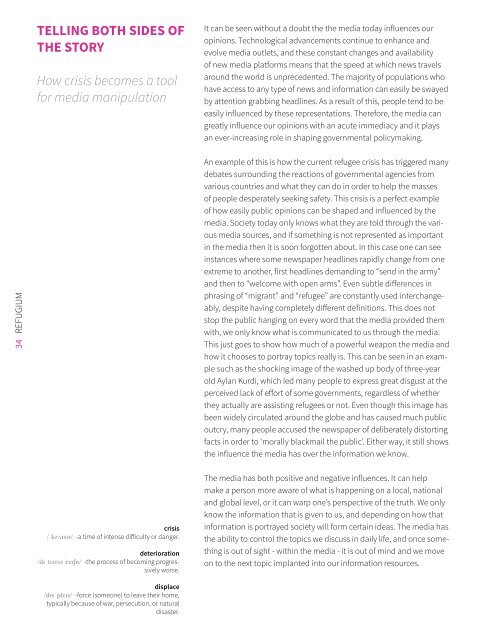Create successful ePaper yourself
Turn your PDF publications into a flip-book with our unique Google optimized e-Paper software.
TELLING BOTH SIDES OF<br />
THE STORY<br />
How crisis becomes a tool<br />
for media manipulation<br />
It can be seen without a doubt the the media today influences our<br />
opinions. Technological advancements continue to enhance and<br />
evolve media outlets, and these constant changes and availability<br />
of new media platforms means that the speed at which news travels<br />
around the world is unprecedented. The majority of populations who<br />
have access to any type of news and information can easily be swayed<br />
by attention grabbing headlines. As a result of this, people tend to be<br />
easily influenced by these representations. Therefore, the media can<br />
greatly influence our opinions with an acute immediacy and it plays<br />
an ever-increasing role in shaping governmental policymaking.<br />
34 REFUGIUM<br />
An example of this is how the current refugee crisis has triggered many<br />
debates surrounding the reactions of governmental agencies from<br />
various countries and what they can do in order to help the masses<br />
of people desperately seeking safety. This crisis is a perfect example<br />
of how easily public opinions can be shaped and influenced by the<br />
media. Society today only knows what they are told through the various<br />
media sources, and if something is not represented as important<br />
in the media then it is soon forgotten about. In this case one can see<br />
instances where some newspaper headlines rapidly change from one<br />
extreme to another, first headlines demanding to “send in the army”<br />
and then to “welcome with open arms”. Even subtle differences in<br />
phrasing of “migrant” and “refugee” are constantly used interchangeably,<br />
despite having completely different definitions. This does not<br />
stop the public hanging on every word that the media provided them<br />
with, we only know what is communicated to us through the media.<br />
This just goes to show how much of a powerful weapon the media and<br />
how it chooses to portray topics really is. This can be seen in an example<br />
such as the shocking image of the washed up body of three-year<br />
old Aylan Kurdi, which led many people to express great disgust at the<br />
perceived lack of effort of some governments, regardless of whether<br />
they actually are assisting refugees or not. Even though this image has<br />
been widely circulated around the globe and has caused much public<br />
outcry, many people accused the newspaper of deliberately distorting<br />
facts in order to ‘morally blackmail the public’. Either way, it still shows<br />
the influence the media has over the information we know.<br />
crisis<br />
/ˈkrʌɪsɪs/ -a time of intense difficulty or danger.<br />
deterioration<br />
/dɪˌtɪərɪəˈreɪʃn/ -the process of becoming progressively<br />
worse.<br />
The media has both positive and negative influences. It can help<br />
make a person more aware of what is happening on a local, national<br />
and global level, or it can warp one’s perspective of the truth. We only<br />
know the information that is given to us, and depending on how that<br />
information is portrayed society will form certain ideas. The media has<br />
the ability to control the topics we discuss in daily life, and once something<br />
is out of sight - within the media - it is out of mind and we move<br />
on to the next topic implanted into our information resources.<br />
displace<br />
/dɪsˈpleɪs/ -force (someone) to leave their home,<br />
typically because of war, persecution, or natural<br />
disaster.




